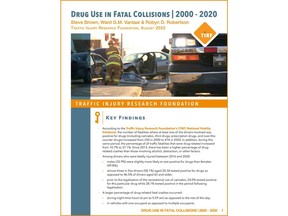
Article content
Drug impairment and distraction were significant contributing factors to drivers killed in road crashes between 2016 and 2020:
- Among impaired drivers, males were slightly more likely to test positive for drugs than females and more than half (58%) of those aged 20-34 tested positive for drugs compared with 46.5% of drivers aged 65 and older.
- Among distracted drivers, females were more likely to be distracted than males, and younger (16-19 years) and older drivers (65+ years) were more likely to be distracted than drivers of other ages.
Advertisement 2
This advertisement has not loaded yet, but your article continues below.
Article content
Article content
OTTAWA, Aug. 25, 2023 (GLOBE NEWSWIRE) — The Traffic Injury Research Foundation (TIRF) has released Drug Use in Fatal Collisions | 2000 – 2020 and Distraction-Related Fatal Collisions | 2000-2020 with sponsorship from Desjardins. Both fact sheets examine the magnitude and trends associated with drugs and distraction, respectively, in motor vehicle fatalities in Canada from 2000 to 2020.
“According to TIRF’s National Fatality Database, the number of road fatalities involving at least one driver testing positive for drugs increased to 474 in 2020, up from 230 in 2000. Drugs included cannabis, illicit drugs, prescription drugs, and over-the-counter drugs,” shares Steve Brown, TIRF Research Associate & Data Collection. “It’s concerning that since 2013, there has been a higher percentage of drug-related crashes than those involving alcohol, distraction, or other factors.”
Among impaired drivers killed in road crashes between 2016 and 2020:
- Males (52.9%) were slightly more likely to test positive for drugs than females (49.8%).
- Almost three in five drivers (58.1%) aged 20-34 years tested positive for drugs as opposed to 46.5% of drivers aged 65 and older.
- Prior to the legalization of recreational cannabis, 24% tested positive for this particular drug but 28.1% tested positive post-legalization.
Article content
Advertisement 3
This advertisement has not loaded yet, but your article continues below.
Article content
“Data from TIRF’s National Fatality Database also show the number of crash fatalities in which at least one of driver was distracted decreased to 310 in 2020 from 458 in 2000,” says TIRF COO, Ward Vanlaar. “Despite this positive downward trend in distraction-related fatalities, progress is smaller in comparison to the general declining trend in all fatalities. This means more enforcement tools and technologies, as well as targeted educational approaches, are needed to achieve further reductions in distraction-related fatalities.”
Among drivers killed in distraction-related collisions between 2016 and 2020:
- Females (18.2%) were more likely to be distracted than males (15.5%).
- Younger drivers (23.1% of those aged 16-19 years) and older drivers (18.2% of those aged 65 years and older) were more likely to be distracted than drivers of other ages.
- Commercial vehicle (heavy trucks and tractor-trailers) drivers were more likely to be distracted (23.9%) than drivers of other highway vehicles.
The trends described in these two fact sheets can help support communities and road safety stakeholders in tailoring enforcement and education initiatives to combat both drug-impaired and distracted driving based on these patterns. It’s important to note that further analysis is needed to determine whether these trends persist and how they may change in response to greater enforcement and new awareness campaigns.
Advertisement 4
This advertisement has not loaded yet, but your article continues below.
Article content
Download the reports:
Fatality Database Disclaimer
Data from TIRF’s National Fatality Database may be subject to change as the closure of cases is ongoing. As such, there may be minor differences in this document compared to previous documents reporting on the same topic.
About TIRF Canada:
The vision of the Traffic Injury Research Foundation (TIRF) is to ensure people using roads make it home safely every day by eliminating road deaths, serious injuries and their social costs. TIRF’s mission is to be the knowledge source for safe road users and a world leader in research, program and policy development, evaluation, and knowledge transfer. TIRF is a registered charity and depends on grants, awards, and donations to provide services for the public. Visit www.tirf.ca or find all TIRF websites and social media at https://linktr.ee/tirfcanada.
Karen Bowman
Director, Communications & Programs
Traffic Injury Research Foundation
613-238-5235 (office)
1-877-238-5235 (toll-free)
250-797-0833 (direct)
613-238-5292 (fax)
tirf@tirf.ca / karenb@tirf.ca
Photos accompanying this announcement are available at:
https://www.globenewswire.com/NewsRoom/AttachmentNg/ff0f34f3-5f87-449a-9084-1955571e0737
https://www.globenewswire.com/NewsRoom/AttachmentNg/f6d5f094-e074-4ecc-80be-74f887598878


Comments
Postmedia is committed to maintaining a lively but civil forum for discussion and encourage all readers to share their views on our articles. Comments may take up to an hour for moderation before appearing on the site. We ask you to keep your comments relevant and respectful. We have enabled email notifications—you will now receive an email if you receive a reply to your comment, there is an update to a comment thread you follow or if a user you follow comments. Visit our Community Guidelines for more information and details on how to adjust your email settings.
Join the Conversation